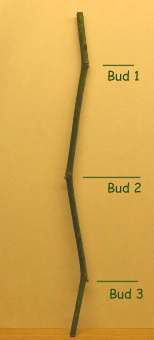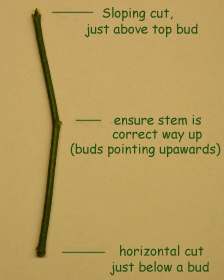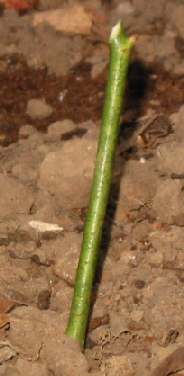Categories
Calendars
Guides
Reviews
Archive
Gallery
Articles
Ask Our Gardening Expert
Shrubs For Free
One of the easiest and most successful methods of increasing
your stock of shrubs is by hardwood cuttings. Use your own
plants or those of your friends (the cutting process will cause
very little damage), to propagate almost all deciduous shrubs
including the following:
Buddleia
When
and How
The first step is to select a stem from the plant. Look for a health
stem about 30cm (1 foot) long from near the base of the
plant. The stem should include at least three buds (see picture on left).
Stems should have been produced from early in the year (i.e.
they are fully mature). If immature stems are selected (i.e.
those produced later in the year), the cutting is liable to rot. Cut the stem from the plant using a sharp knife or secateurs.
The
next step is to correctly trim cutting. Firstly, ensure that you
are holding the cutting the correct way up! In other words
ensure that the buds are pointing upwards. Make a sloping cut
just above the selected top bud. Make a horizontal cut juts
below the selected bottom bud. In the
picture to the right, this gives us three buds (top middle and
bottom), with a length of about 15 cm (6 inches).
Rooting
compound can be applied to the base of the cutting, although
with hardwood cuttings this is not really necessary.
Finally,
choose a small patch of soil which is not over-exposed to the
winter weather (near a wall or hedge is ideal), then dig it over
with a trowel. Simply push the cutting into the earth about half
or two thirds down and gently firm the soil down around the
cutting. Note the the name of the plant on a marker tag and
insert that next to cutting. The picture on the left shows only one cutting, however several can be
inserted near another, just ensure they are not touching. The cuttings should remain undisturbed until next autumn, by which time they
should have rooted sufficiently well for them to be transplanted to their final position.
Cornus (dogwood)
Deutzia
Forsythia
Roses
Spiraea
Viburnum
Wigleia
November to January is the ideal time for hardwood cuttings. This season's
leaves have (or are) fallen off, and the plant has not yet
started to form next year's leaf buds. This is the time when the
plant has the most potential for producing roots from hardwood cuttings.

